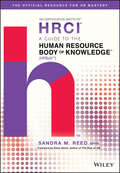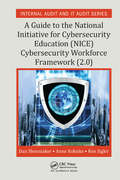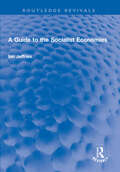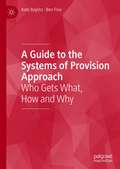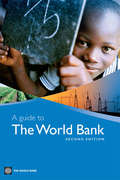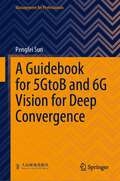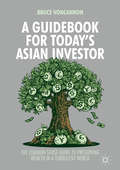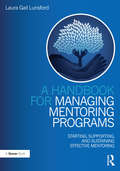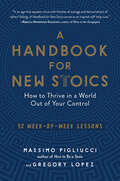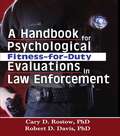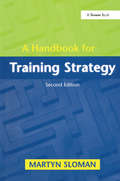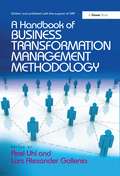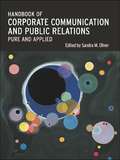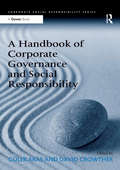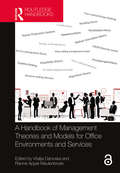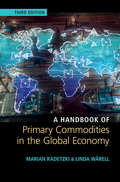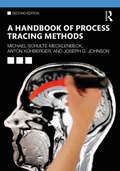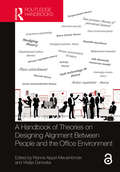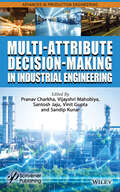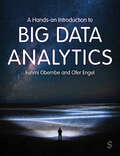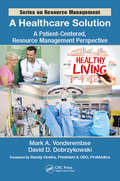- Table View
- List View
A Guide to the Human Resource Body of Knowledge (HRBoK)
by Sandra M. ReedAn essential reference for HR professionals A Guide to the HR Body of Knowledge (HRBoKTM) from HR Certification Institute (HRCI®) is an essential reference book for HR professionals and a must-have guide for those who wish to further their expertise and career in the HR field. This book will help HR professionals align their organizations with essential practices while also covering the Core Knowledge Requirements for all exams administered by HRCI. Filled with authoritative insights into the six areas of HR functional expertise: Business Management and Strategy; Workforce Planning and Employment; Human Resource Development; Compensation and Benefits; Employee and Labor Relations; and Risk Management, this volume also covers information on exam eligibility, and prep tips. Contributions from dozens of HR subject matter experts cover the skills, knowledge, and methods that define the profession's best practices. Whether used as a desk reference, or as a self-assessment, this book allows you to: Assess your skill set and your organization's practices against the HRCI standard Get the latest information on strategies HR professionals can use to help their organizations and their profession Gain insight into the body of knowledge that forms the basis for all HRCI certification exams As the HR field becomes more diverse and complex, HR professionals need an informational "home base" for periodic check-ins and authoritative reference. As a certifying body for over four decades, HRCI has drawn upon its collective expertise to codify a standard body of knowledge for the field. The HRBoK is the definitive resource that will be your go-to HR reference for years to come.
A Guide to the National Initiative for Cybersecurity Education: A Guide To The National Initiative For Cybersecurity Education (nice) Framework (2. 0) (Security, Audit and Leadership Series)
by Dan Shoemaker Anne Kohnke Ken SiglerA Guide to the National Initiative for Cybersecurity Education (NICE) Cybersecurity Workforce Framework (2.0) presents a comprehensive discussion of the tasks, knowledge, skill, and ability (KSA) requirements of the NICE Cybersecurity Workforce Framework 2.0. It discusses in detail the relationship between the NICE framework and the NIST’s cybersecurity framework (CSF), showing how the NICE model specifies what the particular specialty areas of the workforce should be doing in order to ensure that the CSF’s identification, protection, defense, response, or recovery functions are being carried out properly. The authors construct a detailed picture of the proper organization and conduct of a strategic infrastructure security operation, describing how these two frameworks provide an explicit definition of the field of cybersecurity. The book is unique in that it is based on well-accepted standard recommendations rather than presumed expertise. It is the first book to align with and explain the requirements of a national-level initiative to standardize the study of information security. Moreover, it contains knowledge elements that represent the first fully validated and authoritative body of knowledge (BOK) in cybersecurity. The book is divided into two parts: The first part is comprised of three chapters that give you a comprehensive understanding of the structure and intent of the NICE model, its various elements, and their detailed contents. The second part contains seven chapters that introduce you to each knowledge area individually. Together, these parts help you build a comprehensive understanding of how to organize and execute a cybersecurity workforce definition using standard best practice.
A Guide to the Socialist Economies: A Guide (Routledge Revivals)
by Ian JeffriesFirst published in 1990, A Guide to the Socialist Economies explores the evolution of a variety of economic systems in the socialist world and highlights major problems facing fourteen countries – Albania, Bulgaria, China, Cuba, Czechoslovakia, the GDR, Hungary, North Korea, Mongolia, Poland, Romania, the Soviet Union, Vietnam and Yugoslavia –against a background of continuous change, characterized by such events as the Berlin blockade, the Korean war, the Hungarian revolution and the invasion of Czechoslovakia. The traditional Soviet economic model is studied in detail as the basic system adopted by or imposed upon all of these countries. A separate chapter is devoted to foreign trade in general and Comecon in particular, while each of the country studies deals with the political and economic background, economic reforms (including industry, agriculture, the financial system and foreign trade and capital) and the private sector. The book provides information on the economic institutions of all the individual countries which is invaluable if the various courses of reform each country has engaged upon are to be understood. Historical material supplements contemporary information in a work which is to be an essential reference for anyone engaged in a study of, or trade with, the socialist countries.
A Guide to the Systems of Provision Approach: Who Gets What, How and Why
by Ben Fine Kate BaylissUnderstanding consumption requires looking at the systems by which goods and services are provided – not just how they are produced but the historically evolved structures, power relations and cultures within which they are located. The Systems of Provision approach provides an interdisciplinary framework for unpacking these complex issues. This book provides a comprehensive account of the Systems of Provision approach, setting out core concepts and theoretical origins alongside numerous case studies. The book combines fresh understandings of everyday consumption using examples from food, housing, and water, with implications for society’s major challenges, including inequality, climate change, and prospects for capitalism. Readers do not require prior knowledge across the subject matter covered but the text remains significant for accomplished researchers and policymakers, especially those interested in the messy real world realities underpinning who gets what, how, and why across public and private provision in global, national, and historical contexts.
A Guide to the World Bank
by World BankThe World Bank Group is a vital source of financial and technical assistance to developing countries around the world. Its focus is on helping the poorest people in the poorest countries by using its financial resources, staff, and extensive experience to aid countries in reducing poverty, increasing economic growth, and improving quality of life. In partnership with more than 100 developing countries, the Bank Group is striving to improve health and education, fight corruption, boost agricultural support, build roadsand ports, and protect the environment. Other projects are aimed at rebuilding war-torn countries or regions, providing basic services such as access to clean water, and encouraging investments that create jobs. In addition to this critical groundwork around the world, various parts of the World Bank Group are involved in activities ranging from conducting economic research and analysis to providing financial and advisory services to governments and private enterprises. This completely revised and updated second edition provides an accessible and straightforward overview of the World Bank Group's history, organization, mission, and purpose. Additionally, for those wishing to delve further into subjects of particular interest, the book guides readers to sources containing more detailed information, including annual reports, Web sites, publications, and e-mail addresses for various departments. It also provides information on how to work for or do business with the World Bank. A good introduction for anyone interested in understanding what the World Bank Group does and how it does it, this book shows readers who want to learn more where to begin.
A Guidebook for 5GtoB and 6G Vision for Deep Convergence (Management for Professionals)
by Pengfei SunThis book aims to provide the industrial upgrading and business scenario improved and boosted by 5G, as well as to forecast the typical industry application with a 6G vision. At the beginning of the book, it builds an overview of how 5G stimulates industrial transformation in the global digitalization wave, involving its commercial use, policy support, and application development around the world. Also it summarizes the main challenges of 5GtoB in large-scale replication from the perspective of methodology and deduce its development path and future form oriented to XtoB. The author demonstrates the typical applications of 5G in key industries based on a large number of practices and propose common capabilities and essential components for large-scale replication, and details the progress in the convergence of 5GtoB and industry standards. It presents the 6G vision and innovative ToB enabling technologies and describe key technologies, including semantic communication, on-purpose network, and cell-free ultra-massive cooperative MIMO. As conclusion, it forecasts the typical industry applications of 6G, such as metaverse, man–machine interaction, and hyper-connected future city.
A Guidebook for Today's Asian Investor: The Common Sense Guide to Preserving Wealth in a Turbulent World
by Bruce VonCannonThis book is the first to directly address Asia's new rich with an easy-to-follow guide to investment and the world of global finance. There are currently approximately 15 million high net worth households in the world today, a number that is growing by 900,000 new millionaires in the world each year. Many of the Asian new rich, however, lack even basic information about investment strategies and how to put their wealth to work. With rich experience in the private sector, Bruce Von Cannon makes it seem easy in this enjoyable and readable new book.
A Half-Deal
by Marco Di Maggio Carla Larangeira Pedro LevindoIn June 2020, XP and Ita faced intensified competition and tension in their partnership, with the latter owning a minority stake at XP. Two years earlier, in May 2017, Ita had announced it would acquire 49.9% of XP for $1.8 billion, followed by three additional stages leading to company control. Yet in August 2018, Brazil's Central Bank, partially barred the deal, stating Ita could become a minority shareholder.Tensions surfaced as soon as the deal was formalized, with both companies engaging in public attacks across several marketing campaigns, with Ita estimated to lose around $27 million a day to XP from client migration. Moreover, XP faced increased competition from emerging investment platforms that were gaining ground in Brazil s market. By mid-2020, XP s financial results had skyrocketed, taking in $190 million in net income and $743 million in total revenues. As Guilherme Benchimol, XP s CEO, looks ahead, he must define what strategies they should pursue to achieve further growth, considering competitive forces and market opportunities at hand.
A Handbook for Managing Mentoring Programs: Starting, Supporting and Sustaining
by Laura Gail LunsfordDespite the interest and pervasiveness of mentoring there has been little attention devoted to professionalizing mentoring for program managers in learning organizations, especially post-secondary institutions, and there are scant resources available for mentoring coordinators. This book fills that gap. Drawing on research on mentoring and coaching in psychology, education and organizations, this guide translates research into practice by helping program administrators learn more about the behaviors of mentoring, stages of mentoring relationships, elements of high quality relationships, and recognizing and avoiding dysfunctional ones. The book includes diagnostic surveys and case studies that coordinators might use in their programs and makes an important contribution to the literature on mentoring, providing a practical, up-to-date resource for those working in the field on how to set up, run, and evaluate their mentoring programs.
A Handbook for New Stoics: How To Thrive In A World Out Of Your Control--52 Week-by-week Lessons
by Massimo Pigliucci Gregory LopezA pragmatic philosophy more popular than ever—here are 52 ancient lessons to help you overcome adversity and find tranquility in the modern world Stress often comes from situations that are beyond our control—such as preparing for a meeting, waiting for test results, or arguing with a loved one. But we can control our response to these everyday tensions—through the wisdom and practice of Stoicism. Stoicism is an ancient pragmatic philosophy that teaches us to step back, gain perspective, and act with intention. In A Handbook for New Stoics, renowned philosopher Massimo Pigliucci and seasoned practitioner Gregory Lopez provide 52 week-by-week lessons to help us apply timeless Stoic teachings to modern life. Whether you’re already familiar with Seneca and Marcus Aurelius, or you’re entirely new to Stoicism, this handbook will help you embrace challenges, thrive under pressure, and discover the good life!
A Handbook for Psychological Fitness-for-Duty Evaluations in Law Enforcement
by Cary D. Rostow Robert D. DavisWhile some books about police psychology contain a chapter on the fitness-for-duty question, this is the first comprehensive publication focused exclusively on psychological fitness-for-duty evaluations (FFDEs) for law enforcement personnel. This handbook is ideal for professionals and for coursework designed to prepare individuals for careers as police or municipal officials, psychologists, students, behavioral science specialists, human rights advocates, and attorneys. A helpful glossary makes the book even more useful for students and those who do not have extensive academic or formal training in psychology or public administration. A Handbook for Psychological Fitness-for-Duty Evaluations in Law Enforcement describes in detail the mechanics of setting up a fitness-for-duty methodology and examines the effectiveness of FFDEs in law enforcement. You’ll find clear instructions for developing a FFDE system from the law enforcement executive’s viewpoint (valuable for attorneys, police psychologists, and civil service board members as well), and an extensive bibliography with particular emphasis on laws and cases that provide guidance to psychological and law enforcement professionals. Several appendices provide examples of documentation that can be used in the evaluation process. This book brings you reliable information on: legal precedents, with a review of legal cases (in language appropriate for law enforcement executives and psychologists) the interaction between police culture, psychological assessment, and therapy federal laws that impact FFDEs, including the HIPAA, the Americans with Disabilities Act, the Family Medical Leave Act and the Fair Credit Reporting Act case law and FFDEs, with emphasis on civil rights laws, labor issues, professional ethical dilemmas, and the psychologist as a potential expert witness the proper uses—and the misuses—of the FFDE approach police departmental civil liability and the role that the FFDE plays in addressing legal risks In addition, this book contains a succinct review of psychological testing (psychometrics), and the technicalities of employing a professional psychologist to determine the fitness of commissioned officers. A Handbook for Psychological Fitness-for-Duty Evaluations in Law Enforcement proposes a model law that could be used to improve the utility and effectiveness of FFDEs, and presents a forward-looking discussion of FFDE issues that may become controversial in the near future.
A Handbook for Training Strategy
by Martyn SlomanWhen the first edition of Martyn Sloman’s Handbook appeared, it made an immediate impact on the HRD community. Its starting point was the idea that traditional approaches to training in the organization were no longer effective. The Handbook introduced a new model and set out the practical implications. The world of HRD has moved on, and Martyn Sloman has now drastically revised the text to reflect the increased complexity of organizational life and the many recent developments in the field. His aim remains the same: to help readers to develop a framework in which training can be effectively managed and delivered. In Part I of the text the author draws attention to the opportunities created for training by the current emphasis on competition through people. In Part II he poses the question: ’What should training managers be doing to ensure that training in their organization is as good as it can be?’ Here he stresses the need to keep training aligned with business objectives, and to encourage line managers to work alongside the human resource professionals. The third and final Part considers the trainer as a strategic facilitator and examines the skills required. Martyn Sloman writes as an experienced training manager and his book is concerned, above all, with implementation. Thus the text is supported by questionnaires, survey instruments and specimen documents. With its combination of thought-provoking argument and practical guidance, the Handbook will continue to serve all those with an interest in organizational training.
A Handbook of Business Transformation Management Methodology
by Axel Uhl Lars Alexander GolleniaThis book provides an integrative Business Transformation Management Methodology, the BTM², with an emphasis on the balance between the rational aspects of transformation and the often underestimated emotional readiness of employees to absorb and accept transformation initiatives. Comprising four phases - Envision, Engage, Transform, and Optimize - the methodology integrates expertise from areas such as strategy, risk, and project management. Covering the formal and informal structures and roles needed for a successful transformation, the authors cover a wide range of theory to help understand the phenomenon of transformation. A '360-degree' view on what business transformation means and how to manage it successfully, this handbook is suitable for business executives dealing with organizational change. A range of illustrative case studies ensure this is also a valuable resource for academics interested in change and transformation management.
A Handbook of Corporate Communication and Public Relations: Pure And Applied
by Sandra M. OliverA bold addition to existing literature, this book provides an excellent overview of corporate communication. Taking an interdisciplinary approach, it offers readers the in-depth analysis required to truly understand corporate communication, corporate strategy and corporate affairs as well as the relevant public relations issues.With a refreshing ne
A Handbook of Corporate Governance and Social Responsibility (Corporate Social Responsibility)
by Güler ArasThe current economic situation has highlighted deficiencies in corporate governance while also showing the importance of stakeholder relations. It has also raised the profile of the debates regarding corporate social responsibility and shown the inter-relationship with governance. And the two together are essential for sustainable business. The social and environmental contexts of business are generally considered to be as significant as the economic and financial contexts and good governance will address all of these aspects. The combination of these aspects offers long term benefits for a firm, such as reducing risk and attracting new investors, shareholders and more equity as well as sustainable performance. Written by experts from all over the world, A Handbook of Corporate Governance and Social Responsibility is the most authoritative single-volume guide to the relationship between good governance and social responsibility and the reality of managing both. In addition to the theory and practice of governance and CSR, the book includes case studies from large and small organizations and NGOs to highlight examples of good and bad practice, and to show international and cultural similarities and differences while at the same time furthering the debate regarding the relationship between good governance and social responsibility.
A Handbook of Management Theories and Models for Office Environments and Services
by Rianne Appel-Meulenbroek Vitalija DanivskaAlthough workplace design and management are gaining more and more attention from modern organizations, workplace research is still very fragmented and spread across multiple disciplines in academia. There are several books on the market related to workplaces, facility management (FM), and corporate real estate management (CREM) disciplines, but few open up a theoretical and practical discussion across multiple theories from different disciplines. Therefore, workplace researchers are not aware of all the angles from which workplace management and effects of workplace design on employees has been or could be studied. A lot of knowledge is lost between disciplines, and sadly, many insights do not reach workplace managers in practice. Therefore, this new book series is started by associate professor Rianne Appel-Meulenbroek (Eindhoven University of Technology, the Netherlands) and postdoc researcher Vitalija Danivska (Aalto University, Finland) as editors, published by Routledge. It is titled ‘Transdisciplinary Workplace Research and Management’ because it bundles important research insights from different disciplinary fields and shows its relevance for both academic workplace research and workplace management in practice. The books will address the complexity of the transdisciplinary angle necessary to solve ongoing workplace-related issues in practice, such as knowledge worker productivity, office use, and more strategic management. In addition, the editors work towards further collaboration and integration of the necessary disciplines for further development of the workplace field in research and in practice. This book series is relevant for workplace experts both in academia and industry. This second book in the series focuses on the role of workplace management in the organization and the tasks that workplace management needs to consider. The 18 theories that are presented in this book and applied to workplace research discuss management aspects from the organization’s perspective or dive deeper into issues related to people and/or building management. They all emphasize that workplace management is a complex matter that requires more strategic attention in order to add value for various stakeholders. The final chapter of the book describes a first step towards integrating the presented theories into an interdisciplinary framework for developing a grand workplace management theory.
A Handbook of Primary Commodities in the Global Economy
by Marian Radetzki Linda WårellThe 2010s have been a dramatic period for most primary commodity markets. Producers suffered heavily as prices fell in response to new supply facilities going into production, juxtaposed against disappointing demand evolution from China in particular, marking the end of the most powerful and enduring commodity boom since the Second World War. This book is a guide to the primary commodity universe, an increasingly crucial part of the world economy. In this updated edition, Marian Radetzki and Linda W#65533;rell introduce and explain pertinent issues surrounding international commodity markets, including the importance of fossil markets among commodities, price formation, price trends, the shift in primary commodity consumption towards Asia, the increasing reliance on commodity exchanges, new relaxed attitude towards depletion, cartel action, and the revival of nationalism and state ownership. This is an accessible read for graduates, academic researchers, and professionals in the mineral and energy sectors.
A Handbook of Primary Commodities in the Global Economy
by Marian Radetzki Linda WårellThe dramatic price falls of 2014–2015 marked the end of the most powerful and enduring commodity boom since the Second World War. Now in its third edition, this book acts as a guide to the ins and outs of the primary commodity universe. Updates to this edition reflect on the consequences of both China's economic slowdown as its industrialization enters a new, less commodity demanding phase, and changes in the USA's trade policy under the Trump administration. Additionally, this edition takes into account recent developments in world oil markets and examines the effects of increased climate concerns. The authors introduce and explain pertinent issues surrounding international commodity markets such as the global geography of raw materials, price formation, price trends, the role of commodity exchanges, the threat of depletion, cartel action, state ownership, emerging commodity nationalism and more.
A Handbook of Process Tracing Methods: 2nd Edition (The Society for Judgment and Decision Making Series)
by Michael Schulte-Mecklenbeck Anton Kuehberger Joseph G. JohnsonA Handbook of Process Tracing Methods demonstrates how to better understand decision outcomes by studying decision processes, through the introduction of a number of exciting techniques. Decades of research have identified numerous idiosyncrasies in human decision behavior, but some of the most recent advances in the scientific study of decision making involve the development of sophisticated methods for understanding decision process—known as process tracing. In this volume, leading experts discuss the application of these methods and focus on the best practices for using some of the more popular techniques, discussing how to incorporate them into formal decision models. This edition has been expanded and thoroughly updated throughout, and now includes new chapters on mouse tracking, protocol analysis, neurocognitive methods, the measurement of valuation, as well as an overview of important software packages. The volume not only surveys cutting-edge research to illustrate the great variety in process tracing techniques, but also serves as a tutorial for how the novice researcher might implement these methods. A Handbook of Process Tracing Methods will be an essential read for all students and researchers of decision making.
A Handbook of Theories on Designing Alignment Between People and the Office Environment
by Rianne Appel-Meulenbroek; Vitalija DanivskaAlthough workplace design and management are gaining more and more attention from modern organizations, workplace research is still very fragmented and spread across multiple disciplines in academia. There are several books on the market related to workplaces, facility management (FM), and corporate real estate management (CREM) disciplines, but few open up a theoretical and practical discussion across multiple theories from different fields of studies. Therefore, workplace researchers are not aware of all the angles from which workplace management and effects of workplace design on employees has been or could be studied. A lot of knowledge is lost between disciplines, and sadly, many insights do not reach workplace managers in practice. Therefore, this new book series is started by associate professor Rianne Appel-Meulenbroek (Eindhoven University of Technology, the Netherlands) and postdoc researcher Vitalija Danivska (Aalto University, Finland) as editors, published by Routledge. It is titled ‘Transdisciplinary Workplace Research and Management’ because it bundles important research insights from different disciplinary fields and shows its relevance for both academic workplace research and workplace management in practice. The books will address the complexity of the transdisciplinary angle necessary to solve ongoing workplace-related issues in practice, such as knowledge worker productivity, office use, and more strategic workplace management. In addition, the editors work towards further collaboration and integration of the necessary disciplines for further development of the workplace field in research and in practice. This book series is relevant for workplace experts both in academia and industry. This first book in the series focuses on the employee as a user of the work environment. The 21 theories discussed and applied to workplace design in this book address people’s ability to do their job and thrive in relation to the office workplace. Some focus more on explaining why people behave the way they do (the psychosocial environment), while others take the physical and/or digital workplace quality as a starting point to explain employee outcomes such as health, satisfaction, and performance. They all explain different aspects for achieving employee-workplace alignment (EWA) and thereby ensuring employee thriving. The final chapter describes a first step towards integrating these theories into an overall interdisciplinary framework for eventually developing a grand EWA theory. The Open Access version of this book, available at http://www.taylorfrancis.com/books/e/9781003128830, has been made available under a Creative Commons Attribution-Non Commercial-No Derivatives 4.0 license.
A Handbook on Multi-Attribute Decision-Making Methods (Wiley Series in Operations Research and Management Science #212)
by Omid Bozorg-Haddad Hugo A. Loáiciga Babak Zolghadr-AsliClear and effective instruction on MADM methods for students, researchers, and practitioners. A Handbook on Multi-Attribute Decision-Making Methods describes multi-attribute decision-making (MADM) methods and provides step-by-step guidelines for applying them. The authors describe the most important MADM methods and provide an assessment of their performance in solving problems across disciplines. After offering an overview of decision-making and its fundamental concepts, this book covers 20 leading MADM methods and contains an appendix on weight assignment methods. Chapters are arranged with optimal learning in mind, so you can easily engage with the content found in each chapter. Dedicated readers may go through the entire book to gain a deep understanding of MADM methods and their theoretical foundation, and others may choose to review only specific chapters. Each standalone chapter contains a brief description of prerequisite materials, methods, and mathematical concepts needed to cover its content, so you will not face any difficulty understanding single chapters. Each chapter: Describes, step-by-step, a specific MADM method, or in some cases a family of methods Contains a thorough literature review for each MADM method, supported with numerous examples of the method's implementation in various fields Provides a detailed yet concise description of each method's theoretical foundation Maps each method's philosophical basis to its corresponding mathematical framework Demonstrates how to implement each MADM method to real-world problems in a variety of disciplines In MADM methods, stakeholders' objectives are expressible through a set of often conflicting criteria, making this family of decision-making approaches relevant to a wide range of situations. A Handbook on Multi-Attribute Decision-Making Methods compiles and explains the most important methodologies in a clear and systematic manner, perfect for students and professionals whose work involves operations research and decision making.
A Hands-on Introduction to Big Data Analytics
by Funmi Obembe Ofer EngelThis practical textbook offers a hands-on introduction to big data analytics, helping you to develop the skills required to hit the ground running as a data professional. It complements theoretical foundations with an emphasis on the application of big data analytics, illustrated by real-life examples and datasets. Containing comprehensive coverage of all the key topics in this area, this book uses open-source technologies and examples in Python and Apache Spark. Learning features include: - Ethics by Design encourages you to consider data ethics at every stage. - Industry Insights facilitate a deeper understanding of the link between what you are studying and how it is applied in industry. - Datasets, questions, and exercises give you the opportunity to apply your learning. Dr Funmi Obembe is the Head of Technology at the Faculty of Arts, Science and Technology, University of Northampton. Dr Ofer Engel is a Data Scientist at the University of Groningen.
A Hands-on Introduction to Big Data Analytics
by Funmi Obembe Ofer EngelThis practical textbook offers a hands-on introduction to big data analytics, helping you to develop the skills required to hit the ground running as a data professional. It complements theoretical foundations with an emphasis on the application of big data analytics, illustrated by real-life examples and datasets. Containing comprehensive coverage of all the key topics in this area, this book uses open-source technologies and examples in Python and Apache Spark. Learning features include: - Ethics by Design encourages you to consider data ethics at every stage. - Industry Insights facilitate a deeper understanding of the link between what you are studying and how it is applied in industry. - Datasets, questions, and exercises give you the opportunity to apply your learning. Dr Funmi Obembe is the Head of Technology at the Faculty of Arts, Science and Technology, University of Northampton. Dr Ofer Engel is a Data Scientist at the University of Groningen.
A Hard Look at the Options Ahead: The Reality of the Changing Workplace-What's in Store for Generation X?
by Tamara EricksonThe nature and availability of work is changing in important ways, ways that will significantly affect the opportunities open to Generation X over the next several decades. And most of the news is good. Despite near-term job shortages, the longer-term outlook for work is promising. The trend is toward tighter labor markets, providing you greater leverage to find the work you want. Better still, the nature of work, spurred by continuous changes in technology, promises opportunities that are more closely aligned with your values and with the types of lives that you and your fellow X'ers want to lead. This chapter provides a detailed look at changes in immigration, outsourcing, productivity, the nature of the organization, and what that means for Generation X - and what you need to do to take advantage. This chapter was originally published as Chapter 5 of What's Next, Gen X?: Keeping Up, Moving Ahead, and Getting the Career You Want.
A Healthcare Solution: A Patient-Centered, Resource Management Perspective (Resource Management)
by Mark A. Vonderembse David D. DobrzykowskiThe evidence is undeniable. By any measure, the US spends more on healthcare than any other country in the world, yet its health outcomes as measure by longevity are in the bottom half among developed countries, and its health-related quality of life has remained constant or declined since 1998. In addition to high costs and lower than expected outcomes, the healthcare delivery system is plagues by treatment delays as it can take weeks to see a specialist, and many people have limited or no access to care. Part of the challenge is that the healthcare delivery system is a large, complex, and sophisticated value creation chain. Successfully changing this highly interconnected system is difficult and time consuming because the underlying problems are hard to comprehend, the root causes are many, the solution is unclear, and the relationships among problems, causes, and solution are multifaceted. To address these issues, the book carefully explains the underlying problems, examines their root causes using information, data, and logic, and presents a comprehensive and integrated solution that addresses these causes. These three steps are the methodological backbone of this book. A solution depends on understanding and applying the principles of patient-centered care (PCC) and resource management. PCC puts patients, supported by their primary care physicians, back in the role as decision makers and depends on patients being responsible for their health including making good life-style choices. After all, the best way to reduce healthcare costs and increase quality of life is to improve our health and wellness and as a result need less care. In addition, health insurance must be rethought and redesigned so it is less likely to lead to overuse. For many people with health insurance, the out-of-pocket cost of healthcare are small, so healthcare decision making is often biased toward consumption. Effective resource management means that healthcare providers must do a better job of acquiring and using resources in order to provide care quickly, productively, and correctly. This means improving healthcare strategy and management, accelerating the use of information technology, making drug costs affordable and fair, reducing the incidence of malpractice, and rebuilding the provider network.In addition, implementation is difficult because there are many participants in the healthcare delivery value chain, such as physicians, nurses, and medical technicians, as well as many provider organizations, such as hospitals, clinics, physician offices, and labs. Further up the value chain there are pharmaceutical companies, equipment providers, and other suppliers. These participants have diverse and sometimes conflicting goals, but each must be willing to accept change and work in a coordinated manner to improve healthcare. To overcome these problems, strong national leadership is needed to get the attention and support from the people and organizations involved in healthcare and to make the comprehensive changes that will lower healthcare costs, improve healthcare quality, eliminate delays, increase access, and enhance patient satisfaction.
